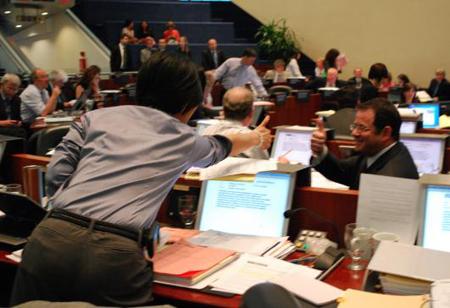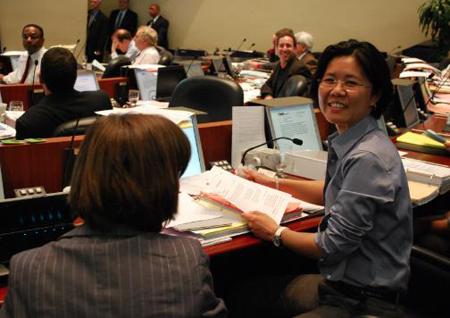
Councillors Kristyn Wong-Tam and James Pasternak. Credit: Andrea Houston
It was stressful for a while, but Toronto city councillor James Pasternak had a change of heart at city council June 15, deciding against calling for “civility” at city events like Pride Week.
Ward 27 Councillor Kristyn Wong-Tam looked relieved and gave Pasternak a thumbs-up just before the vote to adopt a city manager’s report with an amendment to review an update of the city’s anti-discrimination policy.
That’s something Wong-Tam says she completely supports. “He showed me his amendment prior, and I gave him some feedback. He edited it, and now we can move forward on it.”
The one component Wong-Tam asked Pasternak to remove talked about “civility.”
“As an LGBT community, the parade is highly sexualized,” says Wong-Tam. “It is a movement about sexual liberation politics. There are going to be members of our community, whether it’s Totally Naked Toronto or our leather community, who may offend certain people. I’m sure Pride Toronto (PT) has received complaints over the years from the moral police.”
Wong-Tam warned that he is exposing the community to ridicule and judgment with the motion’s language left so wide open. She compares it to religious ceremonies and traditions. “There are all sorts of reenactments of certain acts that can be deemed vicious and violent. Who am I to judge?”
Pasternak says the city needs a “made in Toronto” policy. “Look, the term ‘Israeli apartheid’ is offensive… This is not what we want at city-financed events. We want people to come and be comfortable.”
He says that free speech is not unfettered. “Constraints on free speech is really what the gay community asked for a generation ago… There’s no such thing as free speech. What we want is responsible speech, freedom of expression.”
The city manager’s report, released in April, confirms that the phrase “Israeli apartheid” — and, by extension, the participation by Queers Against Israeli Apartheid (QuAIA) in Pride celebrations — does not violate the city’s anti-discrimination policy, Ontario’s Human Rights Code or Canada’s Criminal Code regarding hate speech. Soon after the report was released, QuAIA announced the group would not enter a contingent in the 2011 parade.
Wong-Tam points out that the city’s anti-discrimination policy is much more broad than any wording enshrined in the Charter of Rights and Freedoms. “It’s already a very good policy and it goes above and beyond what the Charter outlines in terms of our protections. But can it go farther? Yes, I think it can.”
Susan Gapka, from the Trans Health Lobby Group, says she feels relief. She says it was a good gesture by the rookie councillor, “who has been really rigorous on his point of view.”
“With all the drama we went through to get to this point, it seems to be a worthy amendment,” she says. “I also support reviewing the city policy and finding areas of improvement for trans people.”
Other queer activist groups in the city will also want to have a say in how the policy will be rewritten, Wong-Tam says. “For example, does the city provide adequate services and access for first nations people? We should review that under the new anti-discrimination policy.”
That being said, city staff could come back and say “the policy is as good as it gets,” she says. “I suggest they will come back with some changes.”
Wong-Tam says the fight to defend PT’s funding is not over yet. In 2010, PT received a $123,807 grant and about $250,000 worth of in-kind services from the city, including garbage cleanup and policing. Funding will be handed over to PT after the festival, conditional that “no trouble-makers” participate. “So, we should be on the lookout for provocateurs.”

 Why you can trust Xtra
Why you can trust Xtra


